Gerry Adams's Blog, page 54
April 23, 2015
Rambling On Rathlin
 A view from Rathlin
A view from Rathlin

Rathlin Island, off the coast of County Antrim, is our most northern off shore island. I was there at the weekend. The journey over in the ferry from Ballycastle was sublime. It teed up our expectation and anticipation of a wonderful day to come on one of Ireland’s last inhabited islands. The sky was clear, the sea was relatively calm, though still a bit bumpy in parts for those with shaky sea-legs, and the view was breath-taking.
We were greeted as we stepped ashore by the friendly faces and good natured banter of islanders and visitors alike. We were all there to take part in the Rise Foundations Rathlin Ramble to help raise money for a wonderful charity. The Foundation was established in 2009 by the singer and activist, Frances Black. The Black family have deep roots on Rathlin. Their father was an islander.
 Santana, Frances agus Mise
Rise stands for ‘Recovery In a Safe Environment’ and its mission is to support families who are impacted by a loved one's addictive behaviour through awareness, education and therapy. They are dedicated to working towards helping family members to free themselves from the stress, anxiety and worry of having a loved one with addictive behaviour.
Santana, Frances agus Mise
Rise stands for ‘Recovery In a Safe Environment’ and its mission is to support families who are impacted by a loved one's addictive behaviour through awareness, education and therapy. They are dedicated to working towards helping family members to free themselves from the stress, anxiety and worry of having a loved one with addictive behaviour.Rise helps family members understand the nature of addiction and how it impacts on relationships. In this way it hopes to aid families as they work to recover from the effects of the addiction and to support and strengthen families through a very difficult period in their lives.
Two years before the charity was established Frances contacted me and outlined her hopes of establishing an organisation that would help families faced with addiction. Part of her vision for what became ‘Rise’ was the opening of an addiction, education and awareness centre for families on Rathlin Island.
 I thought it was a great idea and asked Conor Murphy, who was then the Minister for Regional Development to see what help and advice he could provide for the project. Conor quickly moved to ensure that part of this engagement with Rathlin would explore opportunities to reverse the years of underinvestment and neglect endured by the islanders.
I thought it was a great idea and asked Conor Murphy, who was then the Minister for Regional Development to see what help and advice he could provide for the project. Conor quickly moved to ensure that part of this engagement with Rathlin would explore opportunities to reverse the years of underinvestment and neglect endured by the islanders.Eventually out of this emerged a new government policy toward Rathlin. But equally importantly for the Rise Foundation the Commissioner of Irish Lights agreed to let the Foundation lease two houses at Rathlin’s remote East Lighthouse. Both are in need of work and Saturday’s ramble around Rathlin is one of the fundraising efforts created by Frances Black and her dedicated team at Rise.
 The ramble covered 7 miles (11.2 km). Rathlin has spectacular scenery and a long history that takes it back to the Neolithic period. It currently has a population of 120 hardy souls. Locals claim that Rathlin was probably the first of our islands to become inhabited. Standing on the north cliffs you get an amazing view of the islands of Scotland and the Mull of Kintyre.
The ramble covered 7 miles (11.2 km). Rathlin has spectacular scenery and a long history that takes it back to the Neolithic period. It currently has a population of 120 hardy souls. Locals claim that Rathlin was probably the first of our islands to become inhabited. Standing on the north cliffs you get an amazing view of the islands of Scotland and the Mull of Kintyre.  Rathlin has a long association with mythical and historical figures from the Tuatha de Danaan to St. Columba. It is also said in the Annals of Ulster that Rathlin experienced the first Viking raid on the island of Ireland. However, one of the best stories told is of the Scottish King Robert the Bruce who hid in a cave – imaginatively named Bruce’s cave - on Rathlin after his defeat by English forces in 1306. Bruce was deeply depressed at his defeat but in his despondency he watched a spider valiantly try seven times before succeeding to bridge a gap between rocks.
Rathlin has a long association with mythical and historical figures from the Tuatha de Danaan to St. Columba. It is also said in the Annals of Ulster that Rathlin experienced the first Viking raid on the island of Ireland. However, one of the best stories told is of the Scottish King Robert the Bruce who hid in a cave – imaginatively named Bruce’s cave - on Rathlin after his defeat by English forces in 1306. Bruce was deeply depressed at his defeat but in his despondency he watched a spider valiantly try seven times before succeeding to bridge a gap between rocks. English soldiers searching for Robert did not search the cave. When they saw the spider's web they concluded that he could not be in the cave without breaking the web. For his part Robert concluded that If the spider did not give up then he should persevere also and off he went and retook his throne.
The Saturday of the Rise Ramble was a beautiful day but in bad weather the treacherous tides and the high cliffs of the island have seen their share of boating tragedies. There have been many Ship wrecks. As a consequence Rathlin had three lighthouses, one of which is the East Lighthouse where the Rise Foundation is hoping to establish their centre.
 Our task on Saturday was less formidable than that of Robert the Bruce but nonetheless very challenging. Our walk along Rathlin’s narrow roads and the stunning views gave us plenty of time to look at the local fauna and admire the many varieties of wildlife that inhabit Rathlin. There is an amazing diversity of birds, from peregrines, and skylarks to lapwings. Along the cliff faces battered by the wild Atlantic there is a huge seabird colony of puffins and others, like guillemots and razorbills birds. They gather in their thousands in the summer months to breed. The uniqueness of this small island is reflected in its recognition as a Special Area of Conservation and the existence of a RSPB nature reserve.
Our task on Saturday was less formidable than that of Robert the Bruce but nonetheless very challenging. Our walk along Rathlin’s narrow roads and the stunning views gave us plenty of time to look at the local fauna and admire the many varieties of wildlife that inhabit Rathlin. There is an amazing diversity of birds, from peregrines, and skylarks to lapwings. Along the cliff faces battered by the wild Atlantic there is a huge seabird colony of puffins and others, like guillemots and razorbills birds. They gather in their thousands in the summer months to breed. The uniqueness of this small island is reflected in its recognition as a Special Area of Conservation and the existence of a RSPB nature reserve.Rathlin also has a great song and music tradition, influenced by the Scots Gaelic heritage. It is a special place. When we arrived back to Bruce's Kitchen for soup and sandwiches a music session was in full swing. Four fiddlers and a box player jigged and reeled us all into The Drawing Of The Raffle organised by the formidable Cathy Farrelly, I didn't win anything. But RISE raised over 7000 euros. Well done to everyone involved.
Later that night there was a ceili. And a sing song. Unfortunately I had to leave before this. But the voyage back to the mainland was shortened by more lively ceol as some of the musicians travelled back with us.
So, well done Frances Black and the Rise Foundation. Thanks for all your work and thanks for a great day out. For more information on Rise check out www.therisefoundation.ie.



Published on April 23, 2015 14:53
April 19, 2015
Vote Yes for Marriage Equality
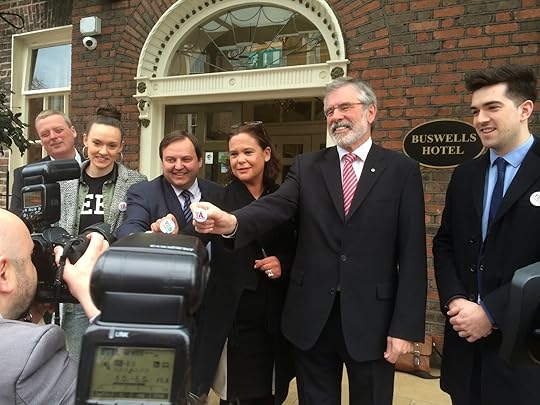 Dublin Launch of Referendums CampaignTwo years ago this week the 100 members of the Constitutional Convention, meeting in the Grand Hotel in Malahide in north Dublin, delivered a decisive vote of 79% in favour of amending the Irish constitution to provide for marriage equality. The three Sinn Féin delegates voted in favour of amending the Constitution to include a positive obligation on the State to give effect to a guarantee of marriage equality and to the equal rights of the children of these marriages. It was described by advocacy groups as ‘an historic step’ and it was. But like all such historic steps toward ending discrimination in all its forms and building real equality into society, there has to be a next step and a next step. In January the government finally published the wording for the referendum on same-sex marriage.
Dublin Launch of Referendums CampaignTwo years ago this week the 100 members of the Constitutional Convention, meeting in the Grand Hotel in Malahide in north Dublin, delivered a decisive vote of 79% in favour of amending the Irish constitution to provide for marriage equality. The three Sinn Féin delegates voted in favour of amending the Constitution to include a positive obligation on the State to give effect to a guarantee of marriage equality and to the equal rights of the children of these marriages. It was described by advocacy groups as ‘an historic step’ and it was. But like all such historic steps toward ending discrimination in all its forms and building real equality into society, there has to be a next step and a next step. In January the government finally published the wording for the referendum on same-sex marriage. In just five weeks’ time two referenda will be held. One is to reduce the eligibility age for a candidate for the Presidential elections. The second is on marriage equality. This referendum vote will decide whether the proposed new wording should be added to the constitution: ‘Marriage may be contracted in accordance with law by two persons without distinction as to their sex.’
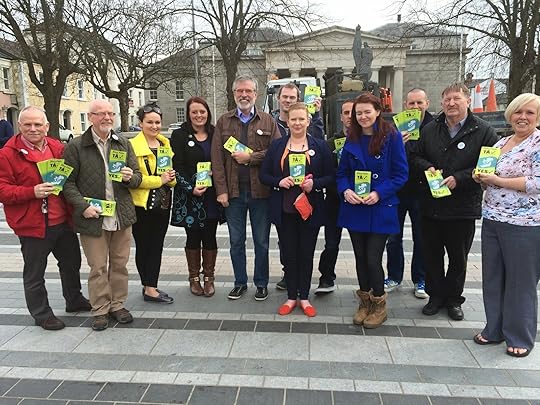 Launch of Yes campaign in LouthEarly opinion polls indicated that there was an overwhelming majority for a Yes vote. Last December the polls indicated as many as 80% of voters would cast a Yes vote. More recent trends have suggested a small decline in that. An Irish Times/Ipsos MRBI poll at the end of March had the Yes side remaining relatively strong at 74%. However campaigners on both sides are very conscious of the volatility of the electorate and the inaccuracy on occasion of polls.
Launch of Yes campaign in LouthEarly opinion polls indicated that there was an overwhelming majority for a Yes vote. Last December the polls indicated as many as 80% of voters would cast a Yes vote. More recent trends have suggested a small decline in that. An Irish Times/Ipsos MRBI poll at the end of March had the Yes side remaining relatively strong at 74%. However campaigners on both sides are very conscious of the volatility of the electorate and the inaccuracy on occasion of polls. In 2013 opinion polls indicated that the Yes side in the referendum to scrap the Seanad would comfortably win with 62% of the vote. On referendum day however the proposal to abolish the Seanad took only 48% of the vote losing by four per cent to the No campaign.
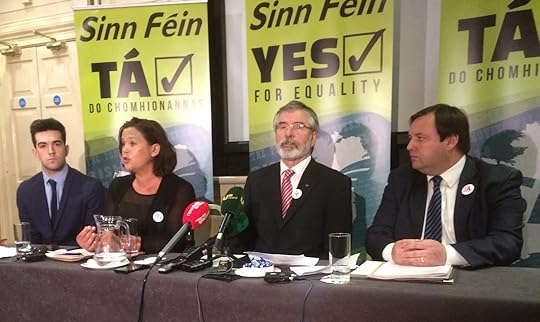 So there can be no room for complacency in advance of May 22nd. Sinn Féin is for a Yes vote. I would appeal to everyone to vote Yes and I would especially urge Yes voters to become active campaigners for a Yes vote.
So there can be no room for complacency in advance of May 22nd. Sinn Féin is for a Yes vote. I would appeal to everyone to vote Yes and I would especially urge Yes voters to become active campaigners for a Yes vote. Many of us will have a member of our family or extended family who is gay. All of us, whatever age we are or wherever we live or work, know someone who is gay. They are our family, our friends, our workmates and our neighbours. They are of all ages and from all walks of life. They want what we want – the right to live their lives as full and contributing citizens and to share in the love of a family of their own.
This month there has been a lot of focus on the Easter Rising. Sinn Féin, the Irish government and many other individuals and organisations have commemorated that historic event and have been setting out their plans for next year’s centenary celebrations.
At the heart of the Easter Rising is the Proclamation of the Republic. It is the founding document of modern Irish Republicanism and for me it is the starting point for my approach to issues of human rights, injustice and inequality.
The Proclamation declares that: ‘The Republic guarantees religious and civil liberty, equal rights and equal opportunities to all its citizens, and declares its resolve to pursue the happiness and prosperity of the whole nation and of all its parts, cherishing all of the children of the nation equally …’
And there you have it. Irish republicans are for equal rights and equal opportunities for all; we are resolved to pursue the happiness of everyone in the nation; and to cherish all the children of the nation equally. It does not say unless you are gay or bisexual or transgender. It doesn’t say unless you are black or a traveller or a woman or a Catholic or a Protestant. There are no exceptions. It doesn’t say whether you are disabled or sick or old. It says ALL its citizens.
The Proclamation wants all of the children of the island of Ireland to be cherished equally and to be happy.
Irish republicans want a society which is inclusive and which respects our diversity. Nothing less can be tolerated in a modern, progressive and inclusive society. A lot of progress has been made on this in recent years. But much more is needed, including tackling the worsening problem of race crime.
On May 22ndthere is an opportunity to take another historic step forward. I would urge everyone to vote Yes. I would also appeal again for everyone to join the campaign for a Yes Vote. If you feel you can’t become part of any of the formal campaigns being organised then become part of the informal campaign.
Talk to your friends, to your workmates, to your family and neighbours and ask them to vote Yes. Text them. Facebook them. Use Twitter. Let’s get the biggest vote possible and ensure that on May 22nd the marriage equality referendum is passed.
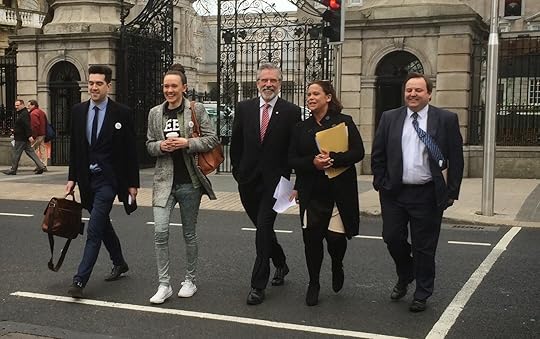
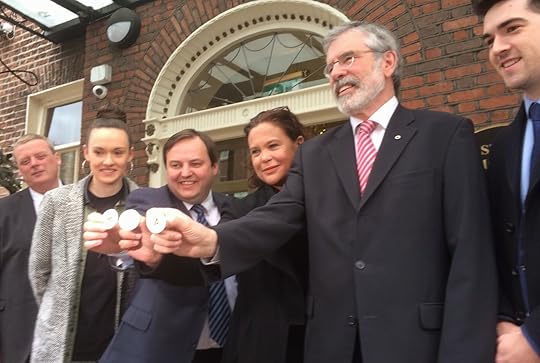 Dublin Launch of Marriage Equality Yes campaign
Dublin Launch of Marriage Equality Yes campaign

Canvassing in Dundalk
Published on April 19, 2015 06:08
April 14, 2015
2016 – A time for Renewal
There are countless dates in Ireland’s long struggle for freedom that deserve commemoration and celebration but none resonate more deeply in the Irish psyche than the Easter Rising of 1916.
One reason for this is the astonishing bravery of the women and men who participated in it and the astonishing steadfastness and resolve of the leaders who faced death with great courage and were executed following it. Another is the Proclamation of the Republic and of the great principles of sovereignty, of freedom and equality, and of civil and religious liberty that it sets out in clear and impassioned language.
However, none of this would have occurred but for the coming together of Irish separatists, republicans, socialists, nationalists, suffragettes, and Irish language activists who coalesced in a great revolutionary effort to liberate Ireland and establish a democratic and egalitarian republic on this island.
It was a transformative moment in Irish history.
It is these principles and ideals that have inspired and motivated subsequent generations of Irish republicans. And it is these which successive Irish governments sought to erase from the story of Easter 1916. The commemorative Programme unveiled by the Irish government last November was widely criticised as short term, shambolic and superficial. Public anger at its promotional video – Ireland Inspires 2016 – was so stinging that it was withdrawn. The video failed to mention the Rising or the Proclamation or the executed leaders. It did however include images of David Cameron, Queen Elizabeth, Bono, and Bob Geldof.
The new programme launched at the end of last month is a much better effort but it still contains gaps. The government approach has been to strip away any politics and context to the rising. To reduce it to a tragedy in which death and injury was inflicted equally on all sides, and so all sides must be equally remembered.
This is a shallow and wholly self-serving approach to our history. Devoid of context or politics the Rising is portrayed by some as a moment in history that should be kept in a little glass case and studied; or in the view of those in the Redmondite wing of Fine Gael an unnecessary moment of madness.
Without a doubt war is brutal. It visits death and injury on all sides. Terrible things are done. We have seen that in our own time during three decades of war. The grief of a mother and father, brother and sister, or son and daughter is not diminished by the circumstance of that loss. The grief experienced by the family of an RUC officer, British soldier, IRA Volunteer or civilian is no different in these times from that of those who died in the GPO or the streets of Dublin and elsewhere in 1916. All have the right to be respected and remembered.
However it is wrong for the state commemoration of 1916 to be reduced to solely to an act of remembrance for a collection of individuals.
While each is a story of individual courage and loss, those involved in the Rising were more than a collection of individuals. They shared an abhorrence of colonialism and imperialism and believed that Ireland’s future must be in the hands of those of us who live on this island. Their view of the world in which they lived was shaped by their experience of the British Empire and the world war.
Those who took part in the Rising gave their lives and liberty, to deliver the republic enshrined in the proclamation. A republic built on the principles of equality and sovereignty, of human rights and civil liberties, and of unity and nationhood. Principles that remain a challenge to successive governments in this state.
It is these principles that the Irish government has a problem with. For Fine Gael and Labour it is easier to deal with the notion of individual loss and sacrifice, than to promote the ideas of the proclamation.
So the government does not address the inequality, division and lack of sovereignty, that drove a generation of republicans onto the streets of Dublin. Heaven forbid that the north is mentioned or that the continued failure that is partition is debated.
The memory and ownership of 1916 does not belong exclusively to Sinn Féin or any other party or to the government. Nor can it be limited to the 26 counties. The south is not the nation. Nor should the commemoration of the rising be limited to a lecture, an exhibition or a parade. It belongs to all the people that share this island and the Irish nation spread across the globe.
While the commemoration must be an opportunity for remembrance, it is also be an opportunity for national renewal, for building a new republic. When it has come and gone there should be more left behind that a memory of a good day out.
That is why Sinn Féin developed a programme of events to mark 1916. We are seeking to encourage communities to engage with their heritage and to rise to the challenge of delivering a republic for citizens.
The most fitting tribute to the loss of this and past generations including republicans, British and civilians is to deliver the republic promised on the steps of the GPO. A 32 county republic in which citizens have equality and rights and the sovereignty of the nation is protected.
This generation has the opportunity and ability to deliver such a republic without the sacrifice of previous generations. The democratic and egalitarian principles contained in the Proclamation are as urgently required in the Ireland of 2015, as they were 99 years ago.
Austerity – whether imposed by a British Tory government or a Fine Gael/Labour government - are anathema to the ideals of the Proclamation.
The year ahead is a time for renewal and planning, a year for promoting the republican ideals of democracy and equality. It is a time for focussing on delivering a genuine republic for the people of this island. This includes securing, in the time ahead, a referendum on Irish Unity so that each and every one of us, working together, can build a new, dynamic country.
Ireland today needs another Rising – a peaceful rising to take control of the ideals of the Proclamation and to put them into practice.
100 years ago in 1915 James Connolly wrote in the foreword to his pamphlet ‘The Reconquest of Ireland’; “The conquest of Ireland had meant the social and political servitude of the Irish masses, and therefore the re-conquest of Ireland must mean the social as well as the political independence from servitude of every man, woman and child in Ireland.”
Our goal must be the reconquest of Ireland by all the people of this island.
One reason for this is the astonishing bravery of the women and men who participated in it and the astonishing steadfastness and resolve of the leaders who faced death with great courage and were executed following it. Another is the Proclamation of the Republic and of the great principles of sovereignty, of freedom and equality, and of civil and religious liberty that it sets out in clear and impassioned language.
However, none of this would have occurred but for the coming together of Irish separatists, republicans, socialists, nationalists, suffragettes, and Irish language activists who coalesced in a great revolutionary effort to liberate Ireland and establish a democratic and egalitarian republic on this island.
It was a transformative moment in Irish history.
It is these principles and ideals that have inspired and motivated subsequent generations of Irish republicans. And it is these which successive Irish governments sought to erase from the story of Easter 1916. The commemorative Programme unveiled by the Irish government last November was widely criticised as short term, shambolic and superficial. Public anger at its promotional video – Ireland Inspires 2016 – was so stinging that it was withdrawn. The video failed to mention the Rising or the Proclamation or the executed leaders. It did however include images of David Cameron, Queen Elizabeth, Bono, and Bob Geldof.
The new programme launched at the end of last month is a much better effort but it still contains gaps. The government approach has been to strip away any politics and context to the rising. To reduce it to a tragedy in which death and injury was inflicted equally on all sides, and so all sides must be equally remembered.
This is a shallow and wholly self-serving approach to our history. Devoid of context or politics the Rising is portrayed by some as a moment in history that should be kept in a little glass case and studied; or in the view of those in the Redmondite wing of Fine Gael an unnecessary moment of madness.
Without a doubt war is brutal. It visits death and injury on all sides. Terrible things are done. We have seen that in our own time during three decades of war. The grief of a mother and father, brother and sister, or son and daughter is not diminished by the circumstance of that loss. The grief experienced by the family of an RUC officer, British soldier, IRA Volunteer or civilian is no different in these times from that of those who died in the GPO or the streets of Dublin and elsewhere in 1916. All have the right to be respected and remembered.
However it is wrong for the state commemoration of 1916 to be reduced to solely to an act of remembrance for a collection of individuals.
While each is a story of individual courage and loss, those involved in the Rising were more than a collection of individuals. They shared an abhorrence of colonialism and imperialism and believed that Ireland’s future must be in the hands of those of us who live on this island. Their view of the world in which they lived was shaped by their experience of the British Empire and the world war.
Those who took part in the Rising gave their lives and liberty, to deliver the republic enshrined in the proclamation. A republic built on the principles of equality and sovereignty, of human rights and civil liberties, and of unity and nationhood. Principles that remain a challenge to successive governments in this state.
It is these principles that the Irish government has a problem with. For Fine Gael and Labour it is easier to deal with the notion of individual loss and sacrifice, than to promote the ideas of the proclamation.
So the government does not address the inequality, division and lack of sovereignty, that drove a generation of republicans onto the streets of Dublin. Heaven forbid that the north is mentioned or that the continued failure that is partition is debated.
The memory and ownership of 1916 does not belong exclusively to Sinn Féin or any other party or to the government. Nor can it be limited to the 26 counties. The south is not the nation. Nor should the commemoration of the rising be limited to a lecture, an exhibition or a parade. It belongs to all the people that share this island and the Irish nation spread across the globe.
While the commemoration must be an opportunity for remembrance, it is also be an opportunity for national renewal, for building a new republic. When it has come and gone there should be more left behind that a memory of a good day out.
That is why Sinn Féin developed a programme of events to mark 1916. We are seeking to encourage communities to engage with their heritage and to rise to the challenge of delivering a republic for citizens.
The most fitting tribute to the loss of this and past generations including republicans, British and civilians is to deliver the republic promised on the steps of the GPO. A 32 county republic in which citizens have equality and rights and the sovereignty of the nation is protected.
This generation has the opportunity and ability to deliver such a republic without the sacrifice of previous generations. The democratic and egalitarian principles contained in the Proclamation are as urgently required in the Ireland of 2015, as they were 99 years ago.
Austerity – whether imposed by a British Tory government or a Fine Gael/Labour government - are anathema to the ideals of the Proclamation.
The year ahead is a time for renewal and planning, a year for promoting the republican ideals of democracy and equality. It is a time for focussing on delivering a genuine republic for the people of this island. This includes securing, in the time ahead, a referendum on Irish Unity so that each and every one of us, working together, can build a new, dynamic country.
Ireland today needs another Rising – a peaceful rising to take control of the ideals of the Proclamation and to put them into practice.
100 years ago in 1915 James Connolly wrote in the foreword to his pamphlet ‘The Reconquest of Ireland’; “The conquest of Ireland had meant the social and political servitude of the Irish masses, and therefore the re-conquest of Ireland must mean the social as well as the political independence from servitude of every man, woman and child in Ireland.”
Our goal must be the reconquest of Ireland by all the people of this island.
Published on April 14, 2015 04:20
April 9, 2015
Irish Times: Anti-Sinn Féin Polemics
April 9th 2015:Below is the text of a letter which I have been trying to get the Irish Times to carry for the last two weeks. It has refused. A chara,The Irish Times has set out its clear opposition to Sinn Féin in advance of the next General Election.Last week the paper published three editorials in the space of seven days questioning Sinn Féin's political bona fides and fitness for Government.In addition Political Editor Stephen Collins (Sinn Féin casts a dark shadow over Irish democracy, The Irish Times, 14th March) made a highly charged, direct appeal to the entire political establishment to unite against Sinn Féin.Fintan O'Toole accused us of putting party interests first; of lying and of being incapable of understanding the concepts of accountability, openness and honesty.Each of these extraordinary anti-Sinn Féin polemics has been based on erroneous information and spurious claims.On March 7th, the editorial made the outrageous, unsubstantiated and entirely false claim that a portion of Sinn Féin's income was derived from illegal sources. There was no attempt to back up this slanderous accusation with any evidence.On March 11th another editorial claimed, completely erroneously, that Sinn Féin had “plunged the political process” in the North into crisis. The facts contradict this. The crisis was sparked by the DUP resiling from a key part of the Stormont House Agreement providing social protections for citizens. However this is now history. The effort must be to fully implement the Stormont House Agreement. That is Sinn Féin’s focus.Then, on March 14th the paper claimed that Sinn Féin had refused to cooperate fully with law enforcement agencies in relation to the serious issue of sexual abuse. Not true. Sinn Féin and I have co-operated fully with An Garda Síochána in relation to these matters. That the attacks on Sinn Féin will intensify as the election draws closer will be no surprise. But as the so-called ‘paper of record’ the Irish Times’ should not resort to misreporting, misleading comment or false accusations.Is Mise,Gerry Adams TD,Teach Laighean,Baile Átha Cliath 2.
Published on April 09, 2015 08:07
April 7, 2015
St. Colmcilles – A Remarkable GAA Club
 Eimear Ferguson is a Sinn Féin Councillor on Meath County Council. She represents East Meath which is part of the Louth constituency. Her father, Dessie, is a former inter county Gaelic footballer with Dublin. He played his club football with St Vincents. He won the All-Ireland Senior Football Championship with Dublin in 1958 and 1963. He moved to Meath and began playing with Gaeil Colmcille winning senior titles with them in 1966 and 1968. So the GAA is in Eimear’s blood.
Eimear Ferguson is a Sinn Féin Councillor on Meath County Council. She represents East Meath which is part of the Louth constituency. Her father, Dessie, is a former inter county Gaelic footballer with Dublin. He played his club football with St Vincents. He won the All-Ireland Senior Football Championship with Dublin in 1958 and 1963. He moved to Meath and began playing with Gaeil Colmcille winning senior titles with them in 1966 and 1968. So the GAA is in Eimear’s blood.A few weeks ago she and I and MEP Matt Carthy visited St. Colmcilles GAA club in East Meath. It was my second visit. It’s an amazing place. St. Colmcilles run many voluntary and community based activities, including mental health projects and it has opened up its sporting facilities for local citizens. The club members provide essential and positive support for hundreds of citizens.
St. Colmcilles is a leading proponent of the GAAs Health Club Initiative which seeks to connect the GAA with communities through health and wellbeing projects. The GAA initiative is a partnership effort involving Healthy Ireland, the Health Service Executive and the National Office for Suicide Prevention. It is funded by the HSE and in February it received a three year – one million euro – investment from Irish Life.
The project is rooted in the volunteer spirit of the GAA. It is about health promotion. It involves a wide range of specific initiatives including mental health, health screening, bullying, diet and nutrition, inclusion and community outreach, drug and alcohol awareness, life skill and personal development, anti-smoking, facilities development and engagement with older community members.
The focus is not only on helping GAA members and their families but is about reaching into the wider community and making available the skills within the GAA that can help citizens. It’s about plugging some of the gaps that occur in the existing community and family supports provided by state agencies.
The Healthy Club project commenced in March 2013. 18 clubs initially took part in the two year pilot phase. It is intended to roll it out across the state. The success of the Healthy Club Project is evident in the decision to select it to participate in a European wide research venture aimed at promoting its implementation as part of the Sports Club for Health (SCforH) programme in EU members states.
Early evaluations of its activities have been very positive.
St. Colmcilles is a first class model of a project which provides advice and support for neighbours.
Even before the Health Clubs project was launched in 2013 the East Meath Club was already involved in its own home grown extensive community outreach programme around mental health. Its ‘How are you feeling today’ programme which has been running for several years, has proven very successful.
Over 100 local people packed into the single storey club house for the first public meeting in 2012 and the project has grown in strength since then. More than 250 citizens, many of whom have no connection to the Club, are now involved in its various programmes, all of which are free but which cost the club over €20,000 to run each year.
The St. Colmcilles initiative is a remarkable example of how a community based organisation like the GAA can strengthen its roots into the community while opening up its facilities and encouraging the development of mental health, youth and other important initiatives. All of these make a significant contribution to society and in some instances are lifesaving.”
The GAA is an outstanding organisation of very dedicated men and women, boys and girls. It exists in every part of this island. Because of our diaspora it is also strong in many other countries. I have watched GAA matches in Chicago and San Francisco and met GAA activists in different parts Europe.
GAA players are role models for our children and as an organisation it contributes significantly to the well being of our citizens and of our society.
The GAA and clubs like St. Colmcilles are making a real and positive difference in peoples’ lives. They contribute freely of their time and talent and they deserve our thanks, our solidarity, our support and our encouragement to continue to do what they do.
Published on April 07, 2015 17:52
April 3, 2015
The People’s Pact
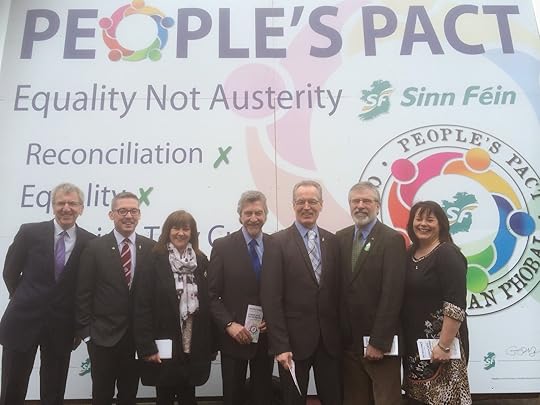
Last Monday was the day 34 years ago when nominations closed for the historic Fermanagh South Tyrone by-election. Bobby Sands was at that point 30 days on hunger strike. He had been joined by Francie Hughes and Raymond McCreesh and Patsy O Hara. The by-election had been caused by the death of Independent MP Frank Maguire. Harry West was the single unionist candidate. Frank’s brother Noel submitted his nomination papers. The SDLP were internally divided over whether Austin Currie should run for them.
On that particular Monday myself and Jim Gibney, and Owen Carron, who was Bobby’s election agent, were sitting in a parked car in the convent grounds across from the electoral office at 40 Northland Row in Dungannon. We had decided that we wouldn’t split the nationalist vote but if Noel Maguire withdrew his nomination then we would withdraw Bobby’s. I was keeping in touch with Francie Molloy who was in contact with republicans in Lisnaskea. We knew Noel had left around 3 pm. At 3.55pm – five minutes before the deadline for withdrawing nomination papers - Noel Maguire arrived from Lisnaskea, entered the electoral office and withdrew his papers.
Speaking to journalists afterward Noel explained that he was withdrawing from the by-election and was throwing his endorsement behind Bobby Sands.
Bobby’s election victory and the subsequent electoral success of Ciaran Doherty in Cavan Monaghan and Kevin Agnew in Louth changed politics on the island of Ireland. The hunger strike elections accelerated the electoral strategy of Sinn Féin and in the south it sounded the death knell of single party governments. From that point on coalition government has been the order of the day.
Coincidently Monday was also the day when the British Prime Minister went off to Buckingham Palace to tell the British monarch that he was formally calling the British general election for May 7th.
Between now and May 7th the airwaves will be full of debate, speculation, political interviews, polemic, false promise, nonsense and party political broadcasts. Acres of newsprint will be devoted to what the political parties, and the scores of candidates in the north have to say on the constitutional issue, as well as on the bread and butter issues of the day.
An added sense of excitement – at least for the political anoraks – has been introduced with the opinion polls in Britain currently predicting a tight race between the Labour and Conservative parties. The role of the smaller parties has come in for scrutiny. Particularly the role of the Scottish National Party. They currently have six MPs but since the failed referendum for independence the SNP has gone from strength to strength. Party membership has rocketed and the pollsters are suggesting that its party strength at Westminster could jump by somewhere between 40 and 50 seats.
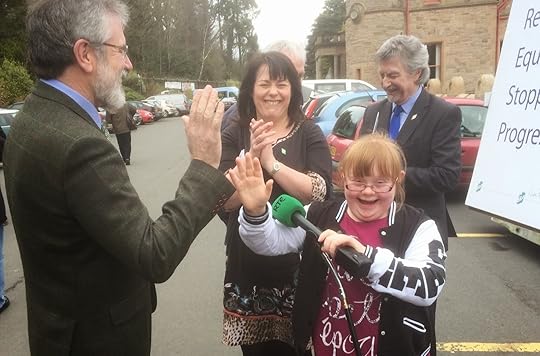 If they succeed in this they should reflect carefully on the experience of the Irish Parliamentary Party in the 19th and early 20thcenturies who propped up Westminster parties with nothing to show for it in the end on the key issue of independence and sovereignty.
If they succeed in this they should reflect carefully on the experience of the Irish Parliamentary Party in the 19th and early 20thcenturies who propped up Westminster parties with nothing to show for it in the end on the key issue of independence and sovereignty. Meanwhile the DUP has been expending a huge amount of energy seeking to convince the unionist electorate that they will be the kingmakers in the new Parliament. Their party election broadcast concentrated almost exclusively on that single theme.
The DUP and the Ulster Unionist Party have also entered into an electoral pact. North Belfast, which now has a nationalist majority, could be won by Gerry Kelly. East Belfast voted Alliance in the last election under embarrassing and difficult circumstances for Peter Robinson. The DUP want to reverse that. Newry and Armagh is a secure nationalist/republican seat but the UUP had to be given something in this largely one sided electoral pact. Perhaps their best chance is in Fermanagh South Tyrone which was held five years ago by Michelle Gildnernew with one vote. You can’t get much closer than that.
In this election the problem for working class unionists; for those who are unemployed or sick or disabled or elderly; and those on low and middle incomes; is that in policy and philosophy the DUP and Ulster Unionist Parties are even more conservative than the Tories. If given the opportunity both unionist parties will support a Tory government that is already committed to stripping £12 billion from the welfare system over the next five years and imposing more draconian austerity policies.
The impact on household income, on jobs, on public services will be disastrous. Their support for an EU referendum could see the British leave the European Union. Will the north be forced to leave also?
The situation is little better with a Labour government. It is committed to sticking with the Tory cuts agenda.
So any parties, which contemplate endorsing or supporting a cabinet of millionaires who are behind budget cuts, cuts to public services and cuts to social protections are ignoring the needs of the people in favour of narrow self interest. Claims that they can influence or moderate the economic policies of the next British government toward the north are empty rhetoric and PR spin.
 Sinn Féin has signed a Peoples Pact. It is a solemn pledge to promote national reconciliation and equality; to stop the Tory cuts and defend the most vulnerable; and to encourage progressive politics.
Sinn Féin has signed a Peoples Pact. It is a solemn pledge to promote national reconciliation and equality; to stop the Tory cuts and defend the most vulnerable; and to encourage progressive politics. Our commitment to the rights of citizens; our determination to stand up to sectarianism and racism and homophobia is the only alternative to the austerity politics of London and Dublin.
Sinn Féin has a credible track record on all of this. Republicans have demonstrated repeatedly over the last 20 years that in direct negotiations with the British we have secured more advances for citizens than any other party.
Sinn Féin is totally committed to defending core public services, including health, education and the welfare system. As an Irish republican party we will resolutely fight for policies that are based on equality, inclusion. We will work hard to protect and safeguard our children with disabilities, adults with severe disabilities and the long term sick.
All of this presents a huge challenge. To succeed we need to secure the largest vote possible. In 35 days the people will have their say.
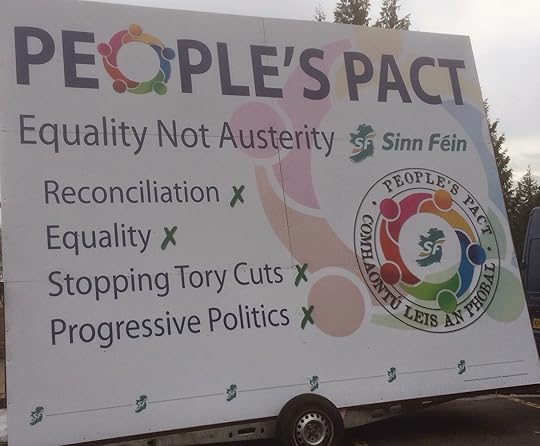
Published on April 03, 2015 07:28
March 27, 2015
St. Paddy’s Day in Washington
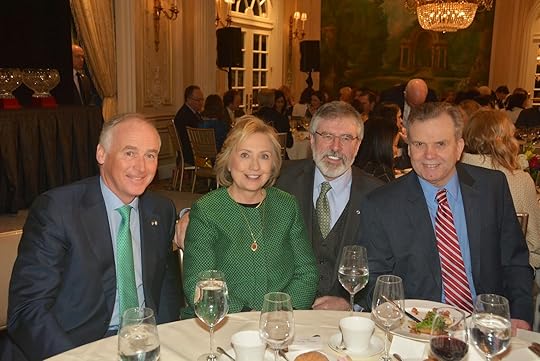
John Fitzpatrick; Hillary Clinton; mise and Niall O Dowd
It’s hard to imagine but my first St. Patrick’s Day Speakers lunch in Washington DC was exactly 20 years ago. It was also my first meeting with President Bill Clinton. The St. Patrick’s Day celebrations in March 1995 also unexpectedly reinforced the sense of power and influence of Irish America. Having failed to stop me getting a visa to visit the USA the British Embassy in Washington in early 1995 went into overdrive to try to blunt Sinn Féin’s engagement with Irish America and with the Clinton Administration.
The Embassy lobbied to prevent me getting another visa; they lobbied to stop me getting an invitation to the Speaker’s Lunch. They lobbied to prevent the White House inviting me to the President’s St. Patrick’s Day event. They lobbied against Sinn Fein getting the right to fund raise. They lobbied Congressional and Senate members not to meet me. The British Secretary of State Patrick Mayhew left Washington convinced that the British would have their way. But he had failed to take proper account of the many political and business leaders who were now solidly behind the peace process. Congressman Ben Gilman and three other co-chairs of the Ad Hoc Committee on Irish Affairs, Peter King, Tom Manton and Richard Neal – Republicans and Democrats – sent a letter to President Clinton supporting my visa. Ted Kennedy phoned President Clinton and other Irish Americans rowed in behind. The President agreed to Americans having the right to fundraise for Sinn Fein and I was invited to the Speakers lunch and the White House St. Patrick’s Day event. The British were furious. Clinton sent a letter to John Major explaining why he had done what he had done. But from March 11th and for five days the British Prime Minister refused to take a telephone call from the President of the United States.The Speaker’s lunch is normally a very formal though relaxed affair. The Speaker of the Congress in 1995 was Newt Gingrich. He welcomed the President and the Taoiseach. Lunch was served and then the President and Taoiseach said a few words. There was a harpist in the corner playing music.This Speakers lunch was for some of those present a more exciting event than normal. It was obvious that everyone in the room was waiting to see how the President, who I had not met before, would respond. I had expected to meet the President once the media were ushered out. But there appeared to be some problems. So after a while I asked Peter King to tell someone in authority that I was going home. There was a flurry of activity and I was introduced to the President. Many of those present applauded. Clinton told me the British government was beating up on him and I remarked; ‘Now you know Mr. President what we have to put up with!’Irish America had succeeded once again in using its influence effectively and positively. Under President Clinton U.S. policy toward Ireland changed to become inclusive, and based on dialogue. In the years that followed Republican Presidents followed this approach.Last week, two decades later that approach hit a glitch. The State Department decided to ‘postpone’ a meeting it said it was due to have with me. It was all a bit odd. No meeting had been agreed. Rita O Hare was still talking to State department officials to see if and when it might happen. It began late on the Sunday evening, a few hours after landing in New York. Richard was contacted by the BBC in Belfast to tell him that they had been informed that the meeting was cancelled. I usually do meetings with the State Department when I am in DC and they attract no media interest at all. But now the media spin was that this was a deliberate snub and was the State Department expressing its displeasure at Sinn Féin’s refusal to vote through the welfare Bill in the Assembly.The handling of this whole affair by the State Department was bizarre. It served no purpose other than to distract attention from the main issue; the full implementation of the Stormont House Agreement. Publicly I said so and I added that it was no skin off my nose not to meet the State Department. Irish American politicians and leaders I met subsequently could not understand the logic of the position and were angered by the State Department decision. Within 24 hours the State Department reversed its briefing to the media. A meeting was arranged. It was a courteous affair. I told the State Department officials that their decision and the manner in which it was made known to Sinn Féin, and to the media, was not the way business should be done and was not helpful. Despite this we had a useful meeting. I briefed them on the current negotiations to resolve the issues around the Stormont House Agreement and told them I remain hopeful that that can be achieved.If there is a lesson out of this it is the continuing importance and influence of Irish America. Without that there may well have been no peace process at that time.
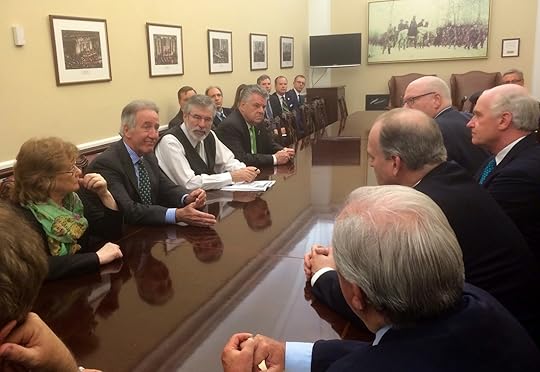
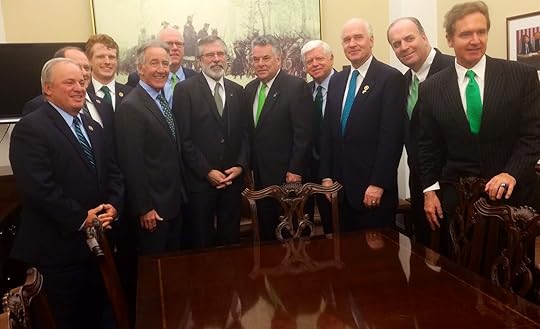
Meeting Congressional leaders on the Hill
And as if to bookend this account of our visit to the USA on the eve of St. Patrick’s Day I attended an event in New York which saw Hillary Clinton inducted into the Irish America Hall of Fame. Her speech focused on the Irish peace process and she identified a key component of any such process, ‘everyone needs to feel the benefits of peace.’
Finally, at our meetings with congressional leaders and the state department I also reminded them of the outstanding issues arising from other agreements, including the British government’s failure to honour its commitment to hold an inquiry into the murder of Pat Finucane and the need for a Bill of Rights. The plight of the 50,000 undocumented Irish was also high on our agenda and I expressed our support for “a waiver policy, removing the current obstacle of the three and ten-year bar for undocumented Irish citizens in the USA”.
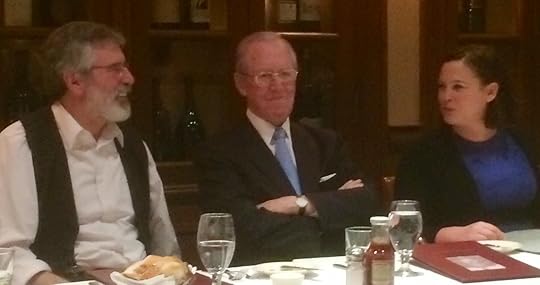
Having lunch with Bill Flynn and Mary Lou McDonald
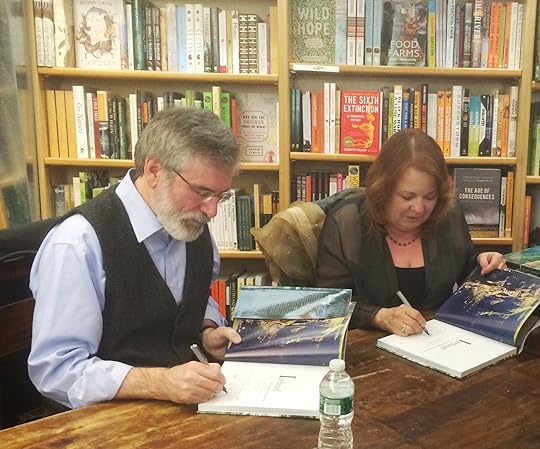
Book signing in New York with Elizabeth Billups
Published on March 27, 2015 04:38
March 14, 2015
The Ard Fheis and Derry; and opposing welfare cuts
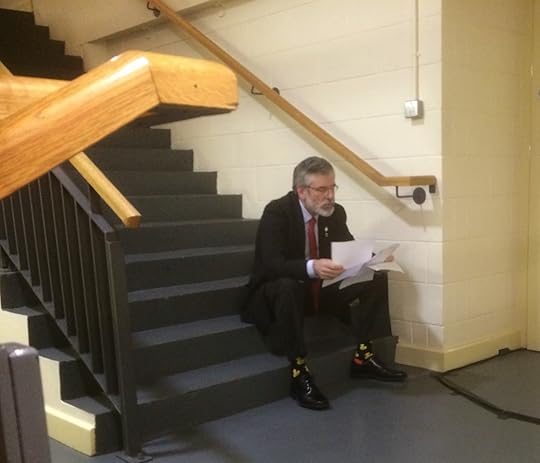 Preparing to give Ard Fheis Speech
The streets of Derry were alive with different accents from all parts of the island of Ireland last weekend. There were the Derry wans, the Belfast ones, Kerry, Cork, Belfast and a myriad of other drawls, twangs and brogues. There were even voices from Canada, the USA, Palestine, South Africa, Cuba, and Greece and a few I didn’t recognise. Probably Inisnagaire.
Preparing to give Ard Fheis Speech
The streets of Derry were alive with different accents from all parts of the island of Ireland last weekend. There were the Derry wans, the Belfast ones, Kerry, Cork, Belfast and a myriad of other drawls, twangs and brogues. There were even voices from Canada, the USA, Palestine, South Africa, Cuba, and Greece and a few I didn’t recognise. Probably Inisnagaire.The Ard Fheis was in town, and the people of Derry were delighted to have us. And we were delighted to be there.
All agreed that it was one of the best Ard Fheiseanna ever. The Millennium Forum was packed from early on Friday evening before the Ard Fheis formally opened. There was a buzz about the place which got louder and more enthusiastic as the weekend proceeded.
There was an energy, an excitement and passion around the debates and contributions from young and old alike. The breadth of issues covered was evidence of a political party that was ebullient and confident and determined.
In the midst of it all Martin McGuinness quietly travelled back and forth between Derry and Belfast trying to engage with the DUP around a worsening crisis on welfare protections that had been agreed at Stormont House at Christmas.
By chance Sinn Féin had discovered that the DUP were intent on reneging on a key element of the Stormont House Agreement that specific categories of citizens on welfare now and in the future would be protected.
As we continued with our behind the scenes efforts to talk to the DUP Martin and I made it clear in our respective speeches to the Ard Fheis that the system of welfare protections were a red line issue. That we intended to keep to our commitments and to keep other parties to theirs also.
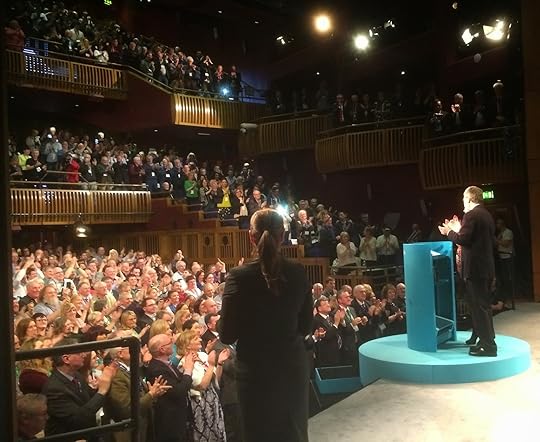
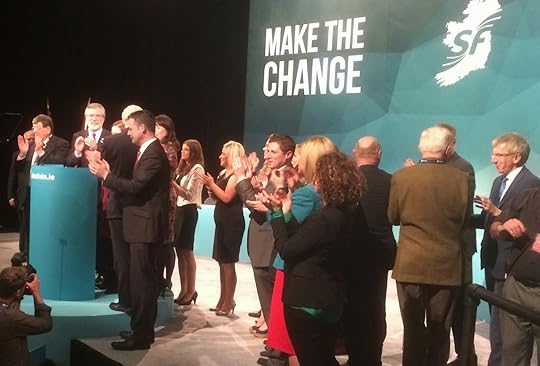 On Monday the final stage of the Welfare Bill was due to be taken in the Assembly. In the absence of any engagement with the DUP – who were refusing to meet Martin – our new Ard Chomhairle, which had only been elected the previous day, was brought together early on Sunday morning.
On Monday the final stage of the Welfare Bill was due to be taken in the Assembly. In the absence of any engagement with the DUP – who were refusing to meet Martin – our new Ard Chomhairle, which had only been elected the previous day, was brought together early on Sunday morning. We discussed the developing situation. We set it against our strategic goals entering the Stormont House negotiations; one of which was to protect the most vulnerable in our society; the disabled, the sick, the elderly and the young. We knew at the time that this was going to be very difficult given the one and a half billion that the British Tory government had already stripped from the block grant. But we were determined to try.
In the course of 11 days of lengthy negotiations much of the focus was on welfare protections. Financial projections were provided by the DUP controlled Finance Department and Department of Social Development. Eventually an agreement was reached which guaranteed benefit protections for current and future applicants in respect of benefits under the control of the Executive.
Famously George Mitchell, who chaired the Good Friday negotiations, had told us at the end of that process that that was the easy bit over. The hardest bit would be ensuring its implementation.
He was right. That has been our experience with the Good Friday Agreement and subsequent agreements. There are key elements of the GFA that have still not been implemented, including a Bill of Rights and the establishment of a Civic Forum. The British and Irish governments have reneged on these.
At Weston Park the British government agreed to establish a full inquiry into the murder of Pat Finucane. The British government has reneged on this also. And at St. Andrew’s in 2006 there was a commitment by the British to legislate for the Irish language through an Acht na Gaeilge. This has been reneged on also.
Mindful of all of this Martin McGuinness and others in our negotiating team have engaged positively with the Party Leaders’ group to ensure the full implementation of the Stormont House Agreement. We had no reason to believe that there was any problem.
On the contrary in a speech on January 12thto the Assembly the DUPs Minister for Social Protection Mervyn Storey said; “I think we need to build on the achievements of the Stormont House Agreement… I have given an undertaking to the Assembly in relation to the information that we will bring to the Assembly in terms of the guidance notes and how the Bill (Welfare Rights) will be subject to a paper that, I trust, I will be able to bring to the Executive shortly, so that we can progress the issue in a way that is efficient and effective, and so no one in Northern Ireland is adversely affected as a result …”
So when the incoming Ard Chomhairle met on Sunday morning they were faced with a difficult unfolding scenario. It was clear that the DUP was intent on reneging on the commitments to protect the most vulnerable. They wanted the Welfare Bill to go through the Assembly on Monday afternoon. Subsequently, it appears that it was their intention to provide only partial protection to current recipients of benefit and no protection whatsoever for future claimants.
This is not what was agreed in the Stormont House negotiations and is totally unacceptable.
If the DUP want to strip benefits from children with disabilities, from adults with severe disabilities, the long-term sick; or push children further into poverty, then it is for them to explain and justify that.
Until the DUP Minister for DSD produces a scheme which reflects what was agreed at Christmas Sinn Féin will not support the Welfare Bill.
Neither is the effort of the DUP to con the other parties, but especially Sinn Féin, on Welfare protections helpful to the overall project. If you seek in a peace process to fool and dupe your political partners then you subvert the entire basis on which such a process must exist.
Sinn Féin wants to resolve this crisis. But it must be done in terms that are acceptable and which protect the most vulnerable and is in keeping with what was agreed at Christmas. We are very mindful that our opposition to the Welfare Bill could have wider implications for the political institutions and the Stormont House Agreement but there can be no resiling on this issue.
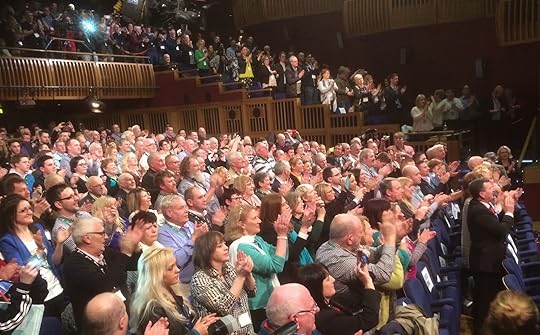
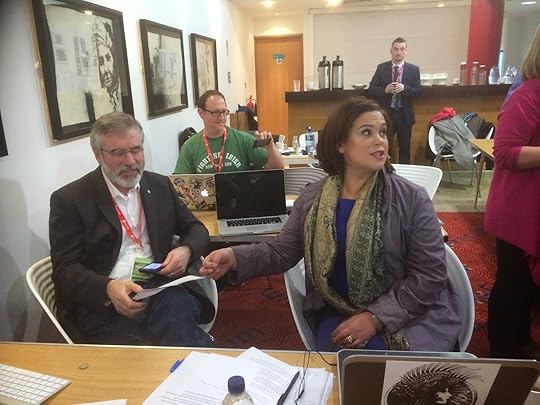
Published on March 14, 2015 08:36
February 15, 2015
Irish government fails to break the connection between sport and alcohol sponsorship
While many of the elements contained in the Bill are important and welcome the government was rightly criticized for failing to tackle the key issue of drinks sponsorship of sporting events.The Dáil was told that the question of sports sponsorship and the associated marketing and advertising of alcohol will be dealt with in a way that does not allow for the deliberate targeting of children.
While the problem of drink linked to children is a matter of concern it is a fact that the greatest number of citizens affected by drink sponsorship of sports are adolescents, young men and women, and older citizens.
A report three weeks from University College Cork on hazardous alcohol consumption involving students – not children - concluded that we need a ban on alcohol sponsorship of sports events. The lead researcher of the study warned that ‘without support at the highest levels for evidence based policy attempts to tackle Ireland’s hazardous relationship with alcohol may prove futile.’
The human and financial cost of alcohol abuse within society is also well established. It has long been recognised that sponsorship of sport by alcohol companies encourages a culture of alcohol misuse. Consequently, there is widespread public support for the proposition that the government should break the connection between alcohol and sport sponsorship.
Professor Joe Barry of Alcohol Action Ireland has said that: “Comprehensive studies have shown that children and young people are not only exposed to a large amount of alcohol advertising through sports sponsorship, but that their behaviour and beliefs are influenced by these positive messages about alcohol and its use, increasing the likelihood that they will start to drink and drink more if already using alcohol.
Simply put, alcohol sponsorship of sport works in terms of increasing sales and, as a result, alcohol consumption. If it didn’t, the alcohol industry simply would not be spending so much money on it.”
The reality is that the linking of a healthy activity, such as a sport, with an unhealthy product, such as alcohol, diminishes the concern that some may have that alcohol is unhealthy and unacceptable.
Some 60,000 teenagers start drinking every year. These young people are most at risk. They are susceptible to the belief – encouraged by alcohol advertising – that drinking alcohol is sophisticated and acceptable.
Sport is hugely important in the lives of citizens. Many take part but most participate through attending GAA matches; or soccer; or rugby; or the many other sports activities that take place every week. Sport is hugely important in providing for a healthy lifestyle but it also plays a significant role in encouraging values like fairness and teamwork. This is undermined and devalued through sports connections with alcohol – just as it was when tobacco companies used to sponsor sporting events.
The misuse of alcohol leads to domestic violence, abuse, premature deaths, road crashes and deaths and injuries, rapes and suicides. A recent report from the Health Research Board said that the role of alcohol in accidental deaths is not fully appreciated. It found that for the years 2008-2009 there were 388 deaths, not including suicide, due to alcohol poisoning and deaths due to trauma, eg drowning, falls, road accidents.
The connection between alcohol use and suicide has been highlighted in numerous reports, both Irish and international. One study of people from three counties who died as a result of suicide found that more than half had alcohol in their blood; those aged less than 30 were more likely to have had alcohol in their blood at the time of death.
All of us know individuals or families blighted by the effect of alcoholism. The human cost to each is huge – the financial cost to the state in terms of our health service - is enormous.
Two weeks ago Leo Varadkar the Minister for Health published his 25 'health priorities'.One of these is to reduce alcohol consumption. However the failure of the government to ban the sponsorship of sporting events by alcohol companies, undermines much of the good that may come out of the Public Health (Alcohol) Bill or the related Sale of Alcohol Bill.
The government’s failure to step up to the mark and ban alcohol sponsorship of sporting events is a disgraceful response to a very serious issue. It is a decision that flies in the face of all of the available medical evidence and smacks of a government acquiescing to pressure from the drinks industry. It also ignores clear evidence that the drinks industry deliberately exploits sport to promote alcohol.
A study of 6,600 adolescents in four European countries, published in December 2012 by Amphora, an initiative of the European Commission, found that ‘Alcohol-branded sport sponsorship influences alcohol consumption among adolescents. Exposure to sport sponsoring can predict future drinking’.
Recently, Mick Loftus a former GAA President pointed out that; “Sponsorship of sport creates this culture that you cannot enjoy life without a drink, which is wrong and leads to problems like binge drinking. As a doctor and a former coroner, I know first-hand the damage alcohol does. Eighty-eight people a month die in this country due to alcohol related reasons. If that number of people were dying any other way they would be taking all sorts of action to try and stop it, but instead they are promoting it. If money comes before people, then it’s a sad day.”
The government has abdicated its responsibility to protect our young people and to tackle the serious problem of alcohol misuse.
Moreover it appears to have done it because, as the Minister for Health said last week, the sports organisations need the €30 million that such deals bring in.
It would appear that the Cabinet chose to ignore all of the available medical advice, scrapped the proposal to break the connection between sport and alcohol, and all to save money.
The government’s lack of action on this also raises the spectre for many citizens that the alcohol companies lobby of government was successful and that the drinks industry is exercising an undue and disproportionate influence on government to prevent any ban from going ahead.
Of course, this isn’t the end of the matter. It is possible to amend the Bill in the Dáil. But given its overwhelming majority and its obvious refusal to deal with the issue of drinks sponsorship and alcohol in writing the Bill it is unlikely that the government will agree to any substantial amendment on this issue.
Published on February 15, 2015 07:06
February 12, 2015
Reclaiming the Vision of 1916: Sinn Féin's Programme for 2016

Bobby Ballagh and mise
Wynn’s Hotel in Lower Abbey Street in the centre of Dublin played a pivotal role in the formation of two of the key groups that shaped the 1916 Easter Rising; Oglaigh na hÉireann – the Irish Volunteers, and the Cumann na mBán.
On November 11th 1913 a small group of republican activists met at Wynn’s Hotel. Present were Bulmer Hobson, Eoin Mac Neill, Padraig Mac Piarais, Sean Mac Diarmada, W.J. Ryan, Eamonn Ceannt, The O'Rahilly, and several more. It was agreed to hold a public recruiting meeting for a body called the Irish Volunteers whose aim was ‘to secure and maintain the common rights and liberties of Irish men’.
Three of those in attendance; Pádraig Mac Piarais, Sean Mac Diarmada, and Eamonn Ceannt were among the signatories of the 1916 Proclamation. They were subsequently executed by the British.
Two weeks after that first inaugural meeting - on November 25th- over seven thousand joined the Volunteers at a meeting in the Rotunda Rink in the grounds of the Rotunda Hospital. On the same night a special section set aside for women was also full.
On April 2nd 1914 the first official meeting of the Cumann na mBán took place in Wynn’s Hotel.

Relatives of 1916 leaders
Last Friday morning Wynn’s Hotel was crowded for the launch of Sinn Féin National Launch 1916 Commemorative Events. Mary Lou MacDonald chaired the event; Martin McGuinness spoke about the importance of 1916, and in particular about the National Monument in Moore Street where the 1916 Leaders met for the last time and which the government has failed to protect or develop properly. James Connolly Heron, the great grandson of James Connolly also spoke. So did I.
The centenary programme is first class. It is our intention to launch it in Belfast in the near future.
The programme includes a re-enactment of the funeral of veteran Fenian Jeremiah O Donovan Rossa on August 1st this year.
Under the title ‘Revolution 1916’ a visitor exhibition will run for 33 weeks in the Ambassador Theatre (part of the Rotunda complex) in O Connell Street commencing on February 27th 2016. This will feature a day-by-day account and legacy of the 1916 Rising through different mediums and artefacts.
Outside the GPO on March 8th 2016 a rally will be held to celebrate the role of women in the Revolutionary period.
A parade of the Irish Citizen Army will take place from Liberty Hall to St. Stephen’s Green with a special emphasis on the Diaspora.
Nationwide Easter Commemoration Parades will take place. Dawn Vigils
will be held outside Kilmainham Gaol on the dates our leaders were executed and in Cork on 9th May and Pentonville on August 3rd 2016.
Over April 24th – 29th 2016 (the actual dates of the Rising) a light show will use the portico of the GPO to depict the story of the Rising.
On Sunday 24th 2016 the Citizens’ Initiative will be holding a national march and rally to ‘Reclaim the Vision of 2016’.
In Belfast there will be events to mark the life of James Connolly and on May 15th 2016 at Arbour Hill there will be an oration and ceremony.
I have no doubt other events local and national will be organised between now and next year.
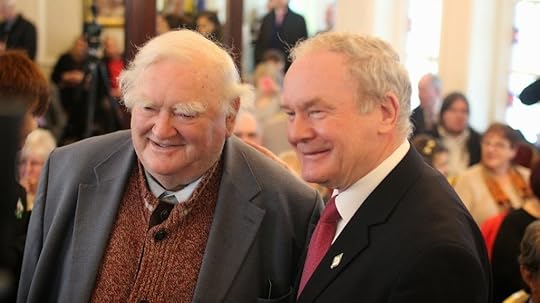
Tim Pat Coogan and Martin McGuinness
This programme is Sinn Féin’s contribution to the centenary celebration of the 1916 Rising – a seminal event which shaped the history of this island for the following 100 years. Other organisations and individuals will also organise and hold their own events.
There has been widespread criticism of the government’s failure to produce a programme of any substance and public reaction to its promotional video – Ireland Inspires 2016 – was so angry that it had to be withdrawn. The 80 second promotional video failed to mention the Rising or the Proclamation or the executed leaders. It did however include images of David Cameron, Queen Elizabeth, Bono, and Bob Geldof.
In stark contrast the video presented at Friday mornings launch of our centenary programme of events is an excellent production which captures the essence of the period and its impact.
This shambolic approach by the Irish government is an accurate reflection of the Fine Gael and Labours leadership’s attitude to 1916, and in particular the Proclamation. Little wonder they don’t want to celebrate the Proclamation.
They don’t believe in it. They are embarrassed by its content.
The government’s failure to protect and properly develop the National Monument in Moore Street, as well as the laneways of history – those adjacent streets and lanes where the men and women of 1916 valiantly fought the British Army – has been shameful.
The Easter Rising saw an alliance of organisations come together, including the Irish Volunteers, the Irish Citizen Army, Sinn Féin, the Irish Republican Brotherhood, the woman's movement, and Irish language activists.
They rose up against British rule in Ireland and declared a Republic. For Ireland and for the British Empire this was a point from which all changed utterly. It was a hugely courageous act. A few hundreds of Irish men and women taking on the might of what was then the largest empire in history, and the foremost global power.
For the British the Easter Rising, and struggle for self-determination and sovereignty, set an example that was to be imitated successfully in the following decades in its countless colonies around the globe.
The British hoped by the speed and scale of the executions that followed that they could extinguish the flame of freedom. They were wrong. At his court martial Pádraig Pearse got it exactly right:
'Believe that we, too, love freedom and desire it. To us it is more desirable than anything in the world. If you strike us down now, we shall rise again to renew the fight. You cannot conquer Ireland. You cannot extinguish the Irish passion for freedom.'
That is absolutely true.
The revolutionary period was followed by a counter revolution. The counter revolutionaries won. Partition and small minded narrow, mean and conservative states were forced upon us. But though the counter revolutionaries won they did not defeat us.
So the centenary celebration of the Easter Rising is a time to build. It is a time to rededicate ourselves to the achievement of the politics of Wolfe Tone, of Padraig Pearse and James Connolly, of Maire Drumm and Mairead Farrell, and of Bobby Sands.
The Proclamation summons her children to her flag and strikes for her freedom. We are those children. I invite you to join in that great historic enterprise.

Published on February 12, 2015 07:36
Gerry Adams's Blog
- Gerry Adams's profile
- 29 followers
Gerry Adams isn't a Goodreads Author
(yet),
but they
do have a blog,
so here are some recent posts imported from
their feed.



